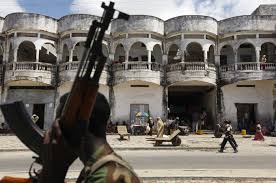By: Hassan M. Abukar
Since 1991, when the Somali state crumpled and the country became engulfed in civil war, many pundits have pontificated about what led to the crisis. Questions abound regarding why the government collapsed and anarchy ensued. Thousands of Somalis were killed; others fled their country and became refugees all over the world. Every day, hundreds of Somalis leave home and venture into the high seas looking for better opportunities. In Kenya alone, close to a half-million Somalis are refugees in Dadaab Camp.
Shaikh Mohamed Idris is a renowned Somali-American cleric who has published a dozen books and, given thousands of lectures that are available on cassettes, CD, DVDs and widely viewed on Somali TVs. He is a globetrotter, always on the move. “I have visited all the Somali communities in the diaspora except the ones in New Zealand and Australia,” he said, smiling. He helps emerging Somali communities in Africa, the Middle East, Europe, and North America to build their own mosques and Islamic schools. He is hotly pursued by various Somali communities as a guest speaker.
 Shaikh Idris is articulate, soft-spoken, and widely read. He is at ease talking about Qur’anic exegesis and modern theories of organizational leadership. He speaks Arabic and English fluently and peppers his language with Somali anecdotes. His wry sense of humor is palpable. When he gives lectures, he has a way of connecting with his audience. One recurring topic in his frequent lectures is the current situation in Somalia.
Shaikh Idris is articulate, soft-spoken, and widely read. He is at ease talking about Qur’anic exegesis and modern theories of organizational leadership. He speaks Arabic and English fluently and peppers his language with Somali anecdotes. His wry sense of humor is palpable. When he gives lectures, he has a way of connecting with his audience. One recurring topic in his frequent lectures is the current situation in Somalia.
Two years ago, as a guest speaker, Idris generated minor controversy in the Abubakar Islamic Center in Minneapolis—the same mosque the FBI investigated for allegedly recruiting missing Somali youths, which turned out to be untrue—when he told the Somali parents present to forget about Somalia’s problems and focus on their children here in the United States. A young man known for his jihadi sympathies protested and became engaged in a scuffle with a mosque administrator. Afterward, the incident went viral in some jihadi websites, condemning Idris as a sell-out and a scholar who had forsaken his own people and country. The radical youths missed the point of Idris’ message, as will be explained later.
What Went Wrong in Somalia
As an Islamic scholar and activist, Shaikh Mohamed Idris views the current situation in Somalia as a result of God’s fate, or what he calls “Qadar-u-Allah” (Allah’s fate). Anything that happens on this planet, whether good or bad, says Idris, is ordained by God. However, God does not change people until they themselves change. While it is God’s fate, Idris makes it clear that the Somali debacle is all the doing of Somalis themselves. “They have destroyed their country in their own hands because of crimes they have done,” explains Idris. Somalis have disobeyed God, became divisive, and performed wrongdoing against each other, he adds. Idris uses the Qur’anic term “Tafarruq” (disunity) as one of the major causes of the Somali crisis. Somalis became divided–clan against clan, group against group, and region against region. What followed was, according to Idris, “Tanaazuc” (to dispute). Somalis became divided and engaged in chronic disputation. Idris mentions this Qur’anic verse as guidance: “…And obey Allah and His Messenger and do not dispute with one another lest you falter, and your strength departs from you; but be steadfast; surely Allah is with the steadfast” (8:24). Somalis have committed “dulmi” (wrongdoing) against God and each other. They have treated each other despicably, discriminated against each other, fought against one another, and failed to maintain order and civility. According to Idris, God does not punish nations just because they are disbelievers; instead, He targets nations that are unjust.

Shaikh Idris would rather have a bad government than no government. Despite his fierce criticism of the Barre regime, Idris saw the semblance of statehood, order, and a functioning government. For example, “In 1972, I was a youngster in Qandala, a town 2000 km away from Mogadishu,” says Idris. That small town of 10,000 residents had a hospital, school, water services, a police station, and postal services. “I used to receive regularly letters from my brother who was in Europe,” he adds. That was a basic service from a functioning government that anyone must appreciate. “Now, in 2014, you can’t even have a letter delivered in Hargeisa or Mogadishu, the capital.”
While the problems in Somalia should be seen in the context of what is going on in many Third World countries, Idris sees Somalia as a unique country that has constantly failed to use its God-given resources. The country has the longest coastline in Africa with a length of 3,300 km, yet it is not utilized. “Our people are hungry, unskilled, and unable to live off such a vast resource alone,” explains Idris. “The real pirates in Somalia are the foreign ships illegally fishing in Somalia’s coast,” he says. “According to a Time magazine report, European ships alone are illegally netting 300 million euros per year from Somali coasts.” It is ridiculous that European countries are attesting that they want to provide foreign assistance to Somalia when some of these states are stealing our resources.
The Way Out
Every problem, of course, has a solution. Shaikh Idris proposes key solutions that can help Somalia extricate itself from its abyss. He is averse to the petty talks about federalism, 4.5 clan power sharing, and these endless—mind you, fruitless—attempts at peace conferences and reconciliation. Idris wants first and foremost for the Somali people to make “tawbah” (repentance) and return to God. Part of the repentance process, he expounds, is to redress the wrongdoing that Somalis have inflicted upon each other. For instance, people who have killed their fellow brothers must confess and address such heinous crimes, and all stolen or confiscated properties should be returned to their rightful owners. “We can’t just shrug off and let bygones be bygones,” he says. “Unfortunately, those leaders who shed blood, forced many of their people to perish in the high seas while seeking refugee status in the Middle East and Europe, and uprooted hundreds of thousands are still around and have the audacity to even ask for more power,” he adds.
The repentance process must be followed by the application of the sharia. Any dispute that may arise must be returned to the Qur’an and the “sunnah” (tradition), says Idris, on the basis of the Qur’anic verse: “…And if you quarrel over anything, refer it back to Allah and His Messenger, if you believe in Allah and the Last Day…” (4:59). Sincere and clean leaders devoid of corruption should take the helm of the country. Idris calls for a genuine reconciliation among Somali groups based on equality, fairness, and justice. Unlike other Islamists who seek a monopoly of power for their groups, Idris is adamant about not letting any group, Islamic or secular, take ownership of the political power. “Somalia is for all,” he states, “and is not beholden to any group.”
Shaikh Mohamed Idris is not your normal cleric who sermonizes and sticks to spiritual guidance. He has been, not long ago, the president and chief operating officer of the North American Council of Somali Imams, a non-profit umbrella organization for Somali-owned Islamic centers. He has been to all cities and towns in which Somalis congregate in the United States. His message to Somalis is rather unconventional: Give priority to your families, children, work, and education here in America. He has constantly warned Somali-Americans not to concern themselves with the politics and the shenanigans of politicians back home who are welcomed here and treated like heroes. “Instead of engaging in ‘fadhi-ku-dirir’ (chatter) in cafes talking nonsense about politics and who became a cabinet minister and who did not,” he admonishes Somalis, “take care of your children who are joining gangs every day.” Idris has told Somalis in this country to become better citizens, engage as active members of their communities, and be united for a common cause and not by clannish grouping. “Somalia should be your fourth or fifth priority,” he tells his audience, “not the first.” He has actively warned young Somalis not to travel to Somalia to join groups that use religion for their devious goals and twisted understanding of Islam. Idris, who does not advocate violence in his speeches or activities, sees saving Somali children from drugs, gangs, and the loss of their religion and culture as the utmost priority of his mission.
Hassan M. Abukar is a freelance writer and political analyst and can be reached at [email protected] .
We welcome the submission of all articles for possible publication on WardheerNews.com. WardheerNews will only consider articles sent exclusively. Please email your article today . Opinions expressed in this article are those of the author and do not necessarily reflect the views of WardheerNews.
WardheerNew’s tolerance platform is engaging with diversity of opinion, political ideology and self-expression. Tolerance is a necessary ingredient for creativity and civility.Tolerance fuels tenacity and audacity.
WardheerNews waxay tixgelin gaara siinaysaa maqaaladaha sida gaarka ah loogu soo diro ee aan lagu daabicin goobo kale. Maqaalkani wuxuu ka turjumayaa aragtida Qoraaga loomana fasiran karo tan WardheerNews.
Copyright © 2024 WardheerNews, All rights reserved


